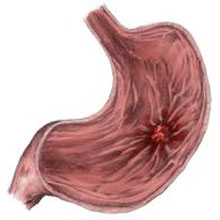
Peptic Ulcers (stomach ulcers) are open sores that develop on the inside wall of the stomach. They may sometimes arise in the small intestine as well. Burning stomach pain is a usual symptom of an ulcer, and this pain may expand through the body. Although in many cases treatment can be straightforward, there can be complications depending on the cause of the ulcer and its severity.
Symptoms of a Stomach Ulcer
- The main symptom of an ulcer is pain.
- Pain is usually felt in the stomach, and may radiate up to the neck or down the legs.
- Usually described as a burning pain.
- Often the pain comes on a few hours after eating.
- Pain at night is common.
- Other less common symptoms include a loss of appetite, vomiting, and indigestion.
Causes
An unhealthy lifestyle, especially a poor diet, was previously thought to be the main cause of developing a peptic ulcer. Whilst this may contribute, it is not the biggest contributing factor. The biggest causes are a form of bacteria called Helicobacter Pylori and also regular, long-term use of anti-inflammatory medications (also known as NSAIDs such as Ibuprofen and Aspirin).
It is difficult to estimate the number of people who suffer from stomach ulcers as they do not always produce symptoms. However, it is estimated that around 4% of adults may be affected. An ulcer may occur at any time in life, although they are most common in those aged over 60.
Diagnosis
A peptic ulcer can be diagnosed using a procedure known as an endoscopy. A small camera is inserted in the mouth, down the throat, and into the stomach. An ulcer can clearly be seen if present, so no other tests are required.
Whilst performing the endoscopy, a small sample of tissue may be taken to test for the presence of the H Pylori bacteria. Other tests for this bacteria include breath tests (after consuming a special drink), stool samples, and blood tests.
Treatment of Peptic Ulcers
Treatment of stomach ulcers depends on the cause of the ulcer. If the ulcer is caused by the H Pylori bacteria alone, then a two-week course of antibiotics should be enough to clear up the infection.
If the main cause is the use of NSAID medications, then a course of Proton Pump Inhibitors (PPIs) lasting 1-2 months may be used. PPIs work by blocking the action of protein pumps which are in part responsible for producing stomach acid. This reduction in acid allows the ulcer to heal on its own, without excess acid irritating it.
For those who do not respond to PPI treatment, a course of H2-receptor antagonists would then be prescribed. The long-term use of anti-inflammatory medication should also be reviewed, with a possible alternative such as paracetamol being recommended.
If both the presence of the H Pylori bacteria and the long-term use of NSAIDs are thought to be responsible, then a course of PPIs will be prescribed first, followed by antibiotics once the first course is finished.
Complications
Bleeding
Internal bleeding is the most common complication of a stomach ulcer and occurs in those whose ulcer develops near a blood vessel. This is more common in older people and those who continue to take anti-inflammatory medication. Bleeding may be mild to moderate, which is not life-threatening but may lead to conditions such as Anemia. Moderate bleeding may be treated with PPIs as it is shown that reducing the acid which comes into contact with the ulcer, allows it to heal naturally.
More severe bleeding may cause the patient to vomit blood or to have very dark, thick stools. This should be treated immediately with blood transfusions to replace any lost blood. Surgery may then be performed to repair the blood vessels.
Perforation
Perforation is where the ulcer eats its way through the stomach wall, causing the contents of the stomach to empty into the abdomen. This is extremely serious and leads to a condition known as Peritonitis – an infection of the lining of the abdomen. This infection can rapidly spread into the blood (known as Sepsis) and then into other organs, resulting in mass organ failure and death.
Symptoms of Peritonitis include the sudden onset of stomach pain which gets steadily worse. Treatment should involve immediate hospital admission, treatment with injected antibiotics, and then surgery to repair the hole in the stomach wall.
Obstruction
Gastric obstruction occurs when the ulcer (or swelling, inflammation, or associated scar tissue, etc) prevents the proper movement of food through the stomach and into the intestine. Symptoms include feeling full and bloated, vomiting lots of undigested food, feeling full quickly, and losing weight.
Treatment depends on the cause of the obstruction, which will be determined via an endoscopy. If it is the ulcer itself, then normal treatment will apply. If the obstruction is caused by scar tissue, then this will be removed surgically.
Stomach Ulcer and Diet
What you eat and drink may affect your ulcer and increase pain levels. Aggravating foods may include:
- Alcohol
- Tea and coffee
- Carbonated drinks
- Chocolate
- Spicy foods
- Citrus fruits
- Meat extracts
- Mustard seeds
- Pepper
It is recommended that eating 5-6 small meals a day (rather than 3 larger ones) may be better for most people with stomach ulcers and cause less aggravation. A fibre-rich diet consisting of lots of fresh fruit (avoiding citrus fruits) and vegetables is also recommended. Also, try to avoid eating within 3 hours of going to bed.